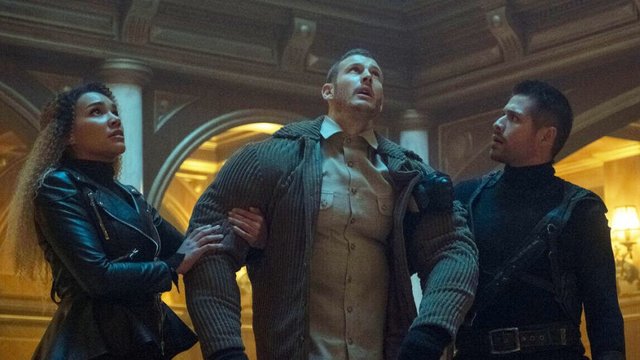Superheroes, particularly the ones that Marvel and DC Comics have spotlighted in massively successful movies, have always operated as wish fulfillment. People want to soar like Superman, solve crimes like Batman, crush tanks like Wonder Woman, be rich and smart like Tony Stark a.k.a. Iron Man, be strong enough to bicep curl a helicopter like Captain America, or wield tornadoes like the X-Men’s Storm.
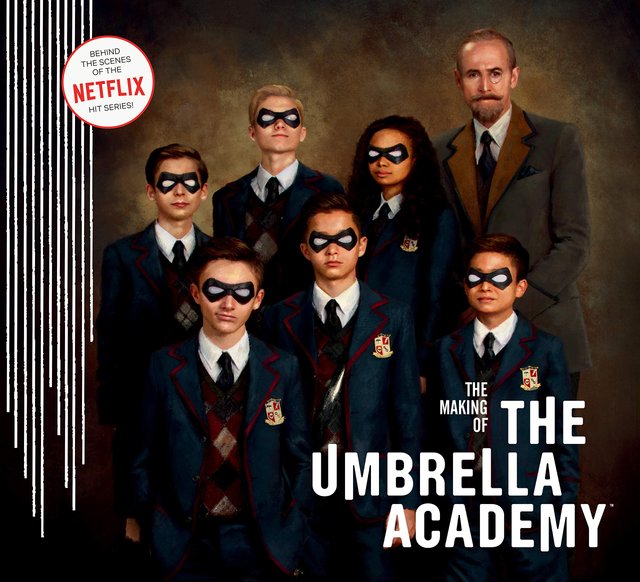
Portraying the rough parts of being a superhero has been a little bit harder, mainly because it’s so hard to believe that superhero lives could ever be that terrible.
How hard could things really get when you’re as beautiful and invulnerable as Superman or Wonder Woman? Is finding love that much a downer when you’re Captain America or Tony Stark? The X-Men, who are treated as freaks by society and whose stories are often read as allegories for America’s shameful behavior in its treatment of minorities, come the closest to showcasing how life as a superhero isn’t always a breeze.
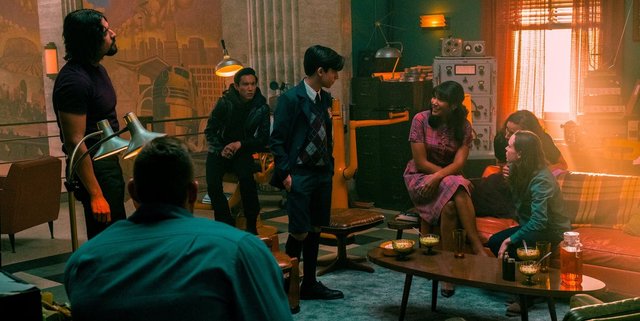 Making the rotten part of being a superhero as essential as the good parts is where Netflix’s The Umbrella Academy begins. The stylish and crackling new series — written by Steve Blackman and developed by Jeremy Slater — is based on the Eisner Award-winning comic book by Gerard Way (who is also the frontman for the band My Chemical Romance, and serves as the Netflix show’s co-executive producer) and artist Gabriel Ba (also a co-executive producer).
Making the rotten part of being a superhero as essential as the good parts is where Netflix’s The Umbrella Academy begins. The stylish and crackling new series — written by Steve Blackman and developed by Jeremy Slater — is based on the Eisner Award-winning comic book by Gerard Way (who is also the frontman for the band My Chemical Romance, and serves as the Netflix show’s co-executive producer) and artist Gabriel Ba (also a co-executive producer).
The show is every bit as good, as delightfully odd, and as touching as the comic.
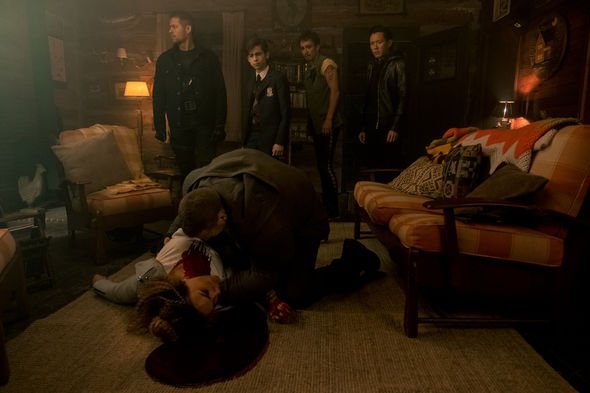 .
.
The basic premise revolves around the parasol protégés: seven kids born to different mothers who are brought together as young children a man named Sir Reginald Hargreeves (Colm Feore) who becomes their adopted “dad.” He assembles them into a makeshift family, helps them hone their powers, and turns them into an efficient and successful teenage superhero squad known as the Umbrella Academy.
Brought to life are the comic book’s kooky, larger-than-life elements like Pogo (Adam Godley), a character who’s analogous to Batman’s Alfred, even though he’s a genius-level chimpanzee. There’s also the time-traveling assassin Cha-Cha, played by the inimitable Mary J. Blige in a razor-slim navy suit. Her presence coincides with a literal apocalypse.
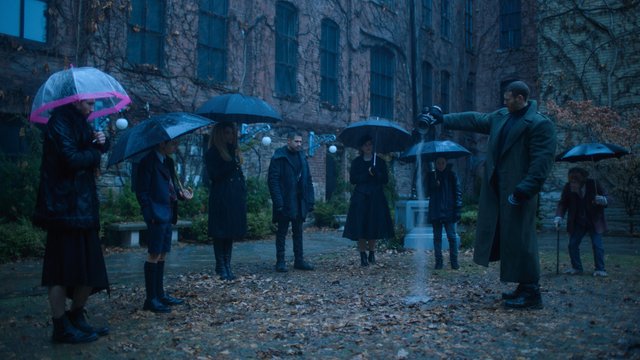
The Umbrella Academy is set in the present, but operates through a series of flashbacks. In hindsight, we see that Hargreeves was adept at teaching his kids to save the world, but less adroit at the fatherhood part of the equation.
His kids are now adult addicts, narcissists, vigilantes — or at the very least, in need of extensive therapy because of the superheroic experiences of their youth. They all dislike each other, not just because of their clashing personalities, but because spending time together reminds them of who they really are. The only thing they can agree on is how much they hate the man who brought them together.
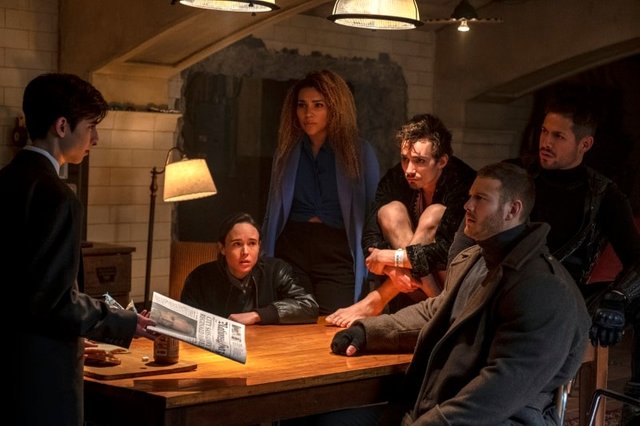
And underneath the series’ handsome sense of style, thrilling visual effects, and expensive-looking sets (a testament to Netflix’s budget or a savvy creative team or both) lies the series’ true objective: to paint a brutal portrait of a damaged, unhappy family that somehow has to help each and other and also save the world.
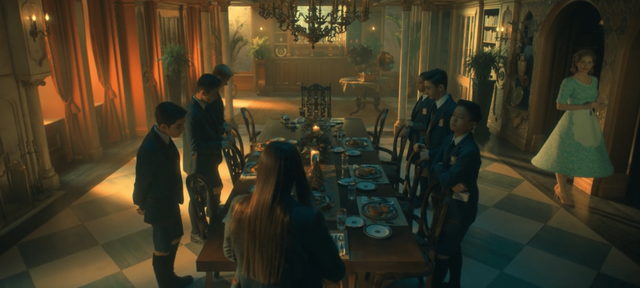
The children of The Umbrella Academy, are a unique wrinkle of cosmic fate. All seven were born at the same exact time (part of a larger group of 43, but only seven were part of the Umbrella Academy), to seven different mothers, some in different corners of the world, on October 1, 1989. Those mothers were not pregnant until the moment they gave birth. For some reason — which the show eventually reveals — Hargreeves knew about the births, procured the children (he paid some mothers generous sums), and assigned them real names, but preferred to use numbers.
Without giving too much away, most of the children — Numbers One through Six — have powers. The exception is Vanya (Ellen Page) a.k.a. Number Seven. Those who’ve read the Umbrella Academy comic books will appreciate how the kids’ various powers manifest and are depicted, but the real treat may be for first timers trying to figure out each kid’s eccentric superpower for the first time.
The show’s action sequences, particularly a salvo in a donut shop, are spiffy, choreographed to dazzle. Blige’s Cha Cha and her partner Hazel (Cameron Britton) get in on the fun too, donning DeadMau5-ish heads and rat-tat-tatting machine guns til kingdom come. The Umbrella Academy loves itself the pattern of music cue followed by comedic interlude followed by acrobatic violence.
Vanya’s lack of powers make her the outlier, a dynamic that each of her siblings interprets differently. Some want to protect her, or overcompensate by coddling her. Others ignore her by leaving her out of battles, because they see her as useless and can’t fathom her ever being an asset.
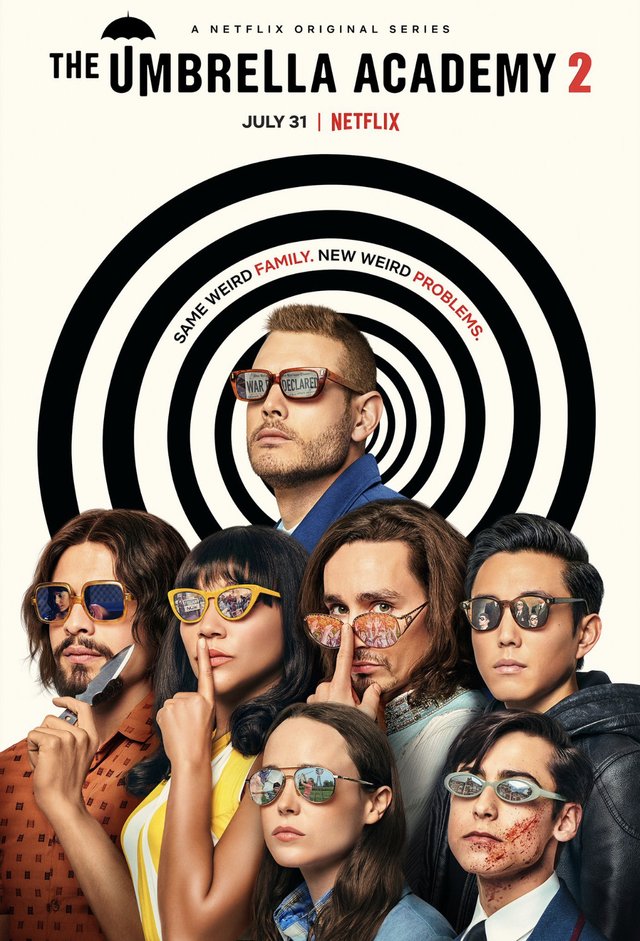 Each of the other six kids has a different and constantly shifting dynamic with the rest of the group. Number One a.k.a. Luther’s (Tom Hopper) devotion to their father rubs some of the others the wrong way. Hargreeves abused Number Four a.k.a. Klaus (Robert Sheehan) due to the nature of Klaus’s powers, spurring the character to engage in drinking and drug binges to dull the pain. Number Three a.k.a. Allison (Emmy Raver-Lampman) has powers that make her untrustworthy, and as a result she’s drifted away from her brothers and sisters. And there’s the peculiar Number Five (Aidan Gallagher), who has been MIA for years.
Each of the other six kids has a different and constantly shifting dynamic with the rest of the group. Number One a.k.a. Luther’s (Tom Hopper) devotion to their father rubs some of the others the wrong way. Hargreeves abused Number Four a.k.a. Klaus (Robert Sheehan) due to the nature of Klaus’s powers, spurring the character to engage in drinking and drug binges to dull the pain. Number Three a.k.a. Allison (Emmy Raver-Lampman) has powers that make her untrustworthy, and as a result she’s drifted away from her brothers and sisters. And there’s the peculiar Number Five (Aidan Gallagher), who has been MIA for years.
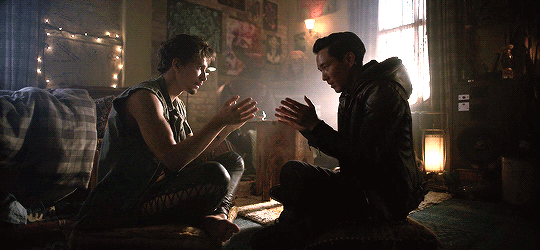
All of that baggage and trauma have followed them into their adult life — where The Umbrella Academy begins. The characters are older but none the wiser. The emotional wounds nicked into them as kids have blossomed into full-fledged demons, haunting each one.
For example, Allison (Number Three) has her own child and her own family now, but even with her powers, she can’t stop her relationships with them from crumbling. And Vanya, basically the towel girl for the team most her life, can’t wring out the smallest semblance of confidence.
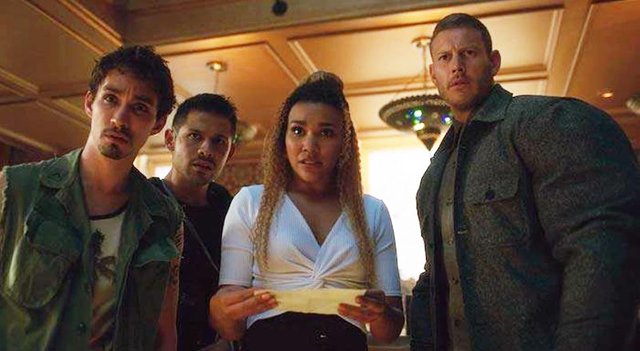 You may, like I did, find yourself gravitating toward or away from some characters and the actors that play them. Page’s Eeyore-ish Vanya and Gallagher’s precocious Number Five are standouts, while Hopper (famous for playing the oft-trolled Dickon in Game of Thrones) is stiff and airless as Number One, in ways the character isn’t meant to be.
You may, like I did, find yourself gravitating toward or away from some characters and the actors that play them. Page’s Eeyore-ish Vanya and Gallagher’s precocious Number Five are standouts, while Hopper (famous for playing the oft-trolled Dickon in Game of Thrones) is stiff and airless as Number One, in ways the character isn’t meant to be.
The Umbrella Academy’s inciting incident is a death in the family, when Hargreeves passes away. As is common even for families who can’t stand each other, everyone is forced to come together when their father dies. But in this case, that just so happens to coincide with an impending apocalypse — it’s unclear who’s behind this doomsday or why it’s happening, but the only thing that can stop it is the Umbrella Academy.
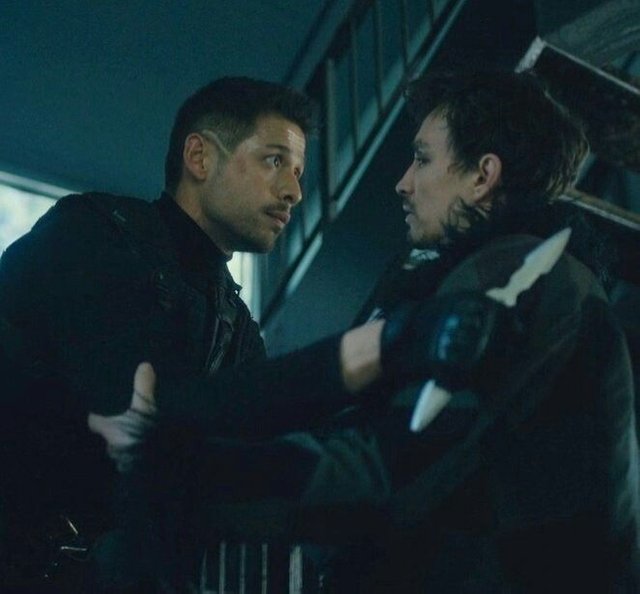 There are instances so frustrating that you’ll want to scream at the characters for falling into old habits or not being able to get out the way of their own hard-headedness. And sometimes touching moments materialize out of the blue — as happens with Allison and Vanya’s strained sisterly bond, emphasizing how much they care for one another and how impossible it is for them to say so.Style and doomsday aside, it’s in these pockets of emotion that The Umbrella Academy flashes its true beauty and intent. The show may be wrapped in superheroics and action, but it’s really about a group of people who have to work through their painful pasts and realize that forgiving one another is far tougher than the bigger task (saving the world, I guess) at hand.
There are instances so frustrating that you’ll want to scream at the characters for falling into old habits or not being able to get out the way of their own hard-headedness. And sometimes touching moments materialize out of the blue — as happens with Allison and Vanya’s strained sisterly bond, emphasizing how much they care for one another and how impossible it is for them to say so.Style and doomsday aside, it’s in these pockets of emotion that The Umbrella Academy flashes its true beauty and intent. The show may be wrapped in superheroics and action, but it’s really about a group of people who have to work through their painful pasts and realize that forgiving one another is far tougher than the bigger task (saving the world, I guess) at hand.
It’s about the unshakeable truth that there are people in this world whose lives you’ve shared (parents, children, siblings). No matter how hard you try to ignore how you’ve changed their lives and they’ve changed yours, for better or worse, that’s what we call family.
The Umbrella Academy debuts on Netflix on February 15, 2019.
